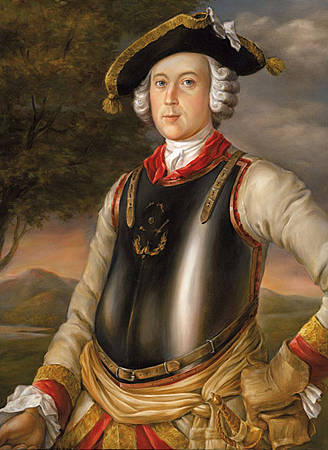<Back to Index>
- Computer Scientist Edsger Wybe Dijkstra, 1930
- Painter Salvador Domingo Felipe Jacinto Dalí y Domènech, 1904
- Cavalry Captain Karl Friedrich Hieronymus, Freiherr von Münchhausen, 1720
PAGE SPONSOR

Karl
Friedrich Hieronymus, Freiherr von Münchhausen (11 May 1720 – 22 February
1797) (often spelled Munchausen in English) was a German baron born in Bodenwerder (Electorate
Brunswick-Lüneburg), who in his youth was sent to serve as page to Anthony
Ulrich
II of Brunswick-Wolfenbüttel, and later joined the Russian
military. He served until 1750, in particular taking part in two
campaigns against the Ottoman
Turks. Returning home, Münchhausen supposedly told a number of
outrageous tall
tales about his
adventures. He died in his birthplace of Bodenwerder. According
to the stories, as retold by others, the Baron's astounding feats
included riding cannonballs,
travelling
to the Moon, and
escaping from a swamp by pulling himself up by his own hair (or bootstraps,
depending
on who tells the story). Born in Bodenwerder,
Electorate
of Brunswick-Lüneburg, Münchhausen was page to Anthony
Ulrich
II of Brunswick-Wolfenbüttel, and moved to his employer
to the Russian
Empire in 1737 - 38.
He followed Anthony Ulrich as a page during the Russo-Turkish
War
(1735 – 1739). In 1737 he attended the siege of the Turkish Fortress
of Ochakiv. He was
named a cornet in the Russian cavalry
regiment ”Brunswick-Cuirassiers“
when
Anthony Ulrich became Russian generalissimo in 1739. In 1740, he was
promoted to lieutenant.
He
was stationed in Riga,
but
participated in two campaigns against the Swedes in 1740 and 1741. When
Anthony Ulrich was imprisoned in 1741, Münchhausen remained in the
service of the Russian military. In 1750, he was named a Rittmeister,
a
cavalry captain. In 1744,
he married Jacobine
von
Dunten at
Pernigel (Latvian: Liepupe) near Dunteshof (Latvian: Dunte)
in Livonia.
After
his retirement, he lived with his wife at his manor in
Bodenwerder until her death in 1790. Here, he acquired a reputation for
his witty and exaggerated tales; at the same time, he was considered an
honest man in business affairs. Münchhausen remarried in 1794; the
marriage ended in a contested, ruinous divorce. Münchhausen died
childless in 1797. The
stories about Münchhausen were first collected and published by an
anonymous author in 1781. An English version was published in London in
1785, by Rudolf
Erich
Raspe, as Baron
Munchhausen's Narrative of his Marvellous Travels and Campaigns in
Russia, also called The Surprising
Adventures of Baron Munchhausen. However,
much
of the humorous material in them is borrowed from other sources.
Indeed, the Baron himself was not notable for immodesty within his
profession and relative to his accomplishments, and Raspe's publication
rather damaged his reputation. Most historians agree that Munchhausen
disapproved of some of the more outrageous of the tall tales that
Raspe's book attributed to him. Some of
it is said to be a spoof based upon James
Bruce. In 1786, Gottfried
August
Bürger translated
Raspe's
stories back into German, and extended them. He published them
under the title of Wunderbare
Reisen
zu Wasser und zu Lande: Feldzüge und lustige Abenteuer des
Freiherrn von Münchhausen ("Marvellous
Travels
on Water and Land: Campaigns and Comical Adventures of the
Baron of Münchhausen"). Bürger's version is the one best
known to German readers today. In the
19th century, the story had undergone expansions and transformations by
many notable authors and had been translated into numerous languages,
totaling over 100 various editions. Baron Munchhausen's adventures have
also been published in Russia, where they are quite commonly known,
especially the versions adapted for children. In 2005 a statue of Munchhausen was erected in the city of Kaliningrad (Königsberg). It is not
clear how much of the story material derives from the Baron himself;
however, it is known that the majority of the stories are based on
folktales that have been in circulation for many centuries before
Münchhausen's birth.